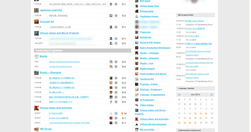Filter 681 resources:
- ai (358)
- innovation (197)
- llm (110)
- creativity (75)
- productivity (54)
- management (52)
- chatgpt (50)
- knowledge management (45)
- startup (43)
- media (34)
- social media (34)
- myhub (31)
- tool (31)
- machine learning (29)
- internal communications (26)
- psychology (25)
- community (23)
- business model (23)
- bot (21)
- news (20)
- disinformation (20)
- algorithm (20)
- organisation (18)
- strategy (18)
- ai4communities (17)
- curation (17)
- newsletter (15)
- ai prompt (15)
- content strategy (14)
- 2ndbrain (14)
- eu (14)
- design (14)
- google (14)
- intranet (14)
- communications (13)
- digital transformation (13)
- gpt-x (13)
- culture (13)
- privacy (12)
- ideation (12)
- open source (11)
- zettelkasten (11)
- journalism (11)
- data (10)
- nlp (10)
- employee engagement (10)
- collaboration (10)
- holacracy (10)
- collective intelligence (10)
- facebook (10)
- fediverse (10)
- filter bubble (9)
- blockchain (9)
- trust (9)
- hr (9)
- design thinking (8)
- disruption (8)
- change (8)
- science (8)
- leadership (8)
- guide (8)
- centaur (8)
- ai-agent-gpt (8)
- search (7)
- bullshit (7)
- k4p (7)
- blogging (7)
- training (7)
- ethics (7)
- storytelling (7)
- audience research (7)
- ethan mollick (7)
- writing (7)
- autonomous (7)
- annotate (6)
- troll (6)
- knowledge graph (6)
- regulation (6)
- participation (6)
- model collapse (6)
- metrics (6)
- decentralised (6)
- ai search (6)
- marketing (6)
- experiment (6)
- project management (6)
- team (5)
- sublime (5)
- cory doctorow (5)
- visualisation (5)
- rag (5)
- advertising (5)
- copyright (5)
- bluesky (5)
- egovernment (5)
- risk (5)
- personal (5)
- futurism (5)
- big data (5)
- obsidian (5)
- agile (5)
- gender (5)
- podcast (5)
- software (5)
- chat (5)
- identity (5)
- video (5)
- content (5)
- bandwagon (5)
- inscrutable (5)
- platform (5)
- information architecture (5)
- technology (4)
- moderation (4)
- conspiracy (4)
- bubble (4)
- langchain (4)
- embedding (4)
- autogpt (4)
- evolution (4)
- longform (4)
- compositional (4)
- hate (4)
- diversity (4)
- content marketing (4)
- twitter (4)
- machine translation (4)
- understanding (4)
- ux (4)
- bbc (4)
- synthesise (4)
- botshit (4)
- peakbot (4)
- product/market fit (4)
- framework (4)
- deep fake (4)
- nytimes (4)
- brainstorming (4)
- perplexity.ai (4)
- cognitive (4)
- comments (4)
- data journalism (4)
- surveillance (3)
- visual (3)
- us2020 (3)
- coach (3)
- philosophy (3)
- andy matuschak (3)
- pkm (3)
- note (3)
- betaworx (3)
- stream (3)
- gordon brander (3)
- business (3)
- mindfulness (3)
- slack (3)
- ibm (3)
- top3pods (3)
- autosummarise (3)
- machine text (3)
- roamresearch (3)
- data enrichment (3)
- llama (3)
- china (3)
- agent (3)
- assistant (3)
- dao (3)
- future (3)
- meta (3)
- augmented reality (3)
- transparency (3)
- harpa (3)
- native advertising (3)
- semantic (3)
- ocm (3)
- douglas rushkoff (3)
- api (3)
- government (3)
- joan westenberg (3)
- sari azout (3)
- notebooklm (3)
- politics (3)
- idpi (3)
- meta ventures (3)
- casey newton (3)
- intro (3)
- intrapreneur (3)
- society (3)
- drupal (3)
- faq (3)
- atprotocol (3)
- chatbot (3)
- publicsector (3)
- happiness (2)
- memory (2)
- ted chiang (2)
- publishing (2)
- minimalist (2)
- education (2)
- office (2)
- openai (2)
- euractiv-com (2)
- signal2noise (2)
- attentionweb (2)
- covid19 (2)
- polarization (2)
- taxibot (2)
- medium (2)
- voice (2)
- use case (2)
- event (2)
- massive.wiki (2)
- audiovisual (2)
- biology (2)
- jeff jarvis (2)
- language (2)
- fomo (2)
- diverse (2)
- ma parent (2)
- network effect (2)
- factchecking (2)
- censorship (2)
- discourse (2)
- media literacy (2)
- security (2)
- brand (2)
- echo chamber (2)
- iot (2)
- google assistant (2)
- emotion (2)
- gpt-4o (2)
- conference report (2)
- entrepreneurs (2)
- digital (2)
- ecosystem (2)
- early adopter (2)
- amazon (2)
- open innovation (2)
- readwise (2)
- mvp (2)
- competition (2)
- consultancy (2)
- subconscious (2)
- gds (2)
- basic (2)
- policy (2)
- gtd (2)
- vc (2)
- purpose (2)
- cryptocurrency 2.0 (2)
- newsroom (2)
- uncategorized (2)
- open data (2)
- online architecture (2)
- jobtodo (2)
- ontology (2)
- knowledge visualisation (2)
- ipr (2)
- automation (2)
- mental health (2)
- plugin (2)
- code interpreter (2)
- m365 (2)
- trump (2)
- notion (2)
- bloom (2)
- alignment (2)
- datamining (2)
- information-architecture (2)
- learning (2)
- crowdsourcing (2)
- authenticity (2)
- publicsphere (2)
- morality (2)
- bias (2)
- emily m bender (2)
- democracy (2)
- safety (2)
- social challenges (2)
- groupthink (2)
- bloggingportal (2)
- startupy (2)
- propaganda (2)
- science journalism (2)
- claude code (2)
- ai-image (2)
- economy (2)
- dall-e3 (1)
- adobe (1)
- quality (1)
- boston consulting group (1)
- jagged frontier (1)
- cyborg (1)
- autogen (1)
- fraud (1)
- reference frame (1)
- bedrock (1)
- ai-vision (1)
- questy (1)
- fastlane (1)
- faiss (1)
- sensecraft (1)
- nostr (1)
- smart connections (1)
- mixture of experts (1)
- mistral (1)
- alan blackwell (1)
- criti-hype (1)
- enshittification (1)
- overview (1)
- meaning alignment institute (1)
- sift (1)
- course (1)
- o'reilly (1)
- commoditisation (1)
- linear (1)
- butter (1)
- napkin ai (1)
- robert putnam (1)
- will storr (1)
- richard dawkins (1)
- dopamine (1)
- arena (1)
- membrain (1)
- grift (1)
- ludicity (1)
- nature magazine (1)
- ourobouros (1)
- capacities (1)
- ghostreader (1)
- embodiment (1)
- anthropomorphic (1)
- chinese room (1)
- anthropocentric (1)
- spotify (1)
- reversal curse (1)
- hubspot (1)
- llmo (1)
- sub.club (1)
- false memory (1)
- o1 (1)
- brave (1)
- extraheric (1)
- unfinished (1)
- whitewind (1)
- blacksky (1)
- detect (1)
- open social (1)
- groundmist (1)
- grjte (1)
- atprotocol lexicon (1)
- leaflet (1)
- ai psychosis (1)
- laurens hof (1)
- semble (1)
- ai reasoning (1)
- simon willison (1)
- gas town (1)
- gdpr (1)
- damien van achter (1)
- genius (1)
- web design (1)
- humour (1)
- persuasion (1)
- virtual reality (1)
- habit (1)
- addiction (1)
- reddit (1)
- promotion (1)
- backfire effect (1)
- cmv (1)
- confirmation bias (1)
- original (1)
- explainer (1)
- linkedin (1)
- meditation (1)
- populism (1)
- instagram (1)
- hype (1)
- ui (1)
- information (1)
- dikw (1)
- defensibility (1)
- ub (1)
- garden (1)
- compass news (1)
- journal (1)
- psychometrics (1)
- nudge (1)
- behaviour (1)
- science communication (1)
- devops (1)
- free speech (1)
- infowar (1)
- computational propaganda (1)
- viral (1)
- process (1)
- fakebox (1)
- overfitting (1)
- wikipedia (1)
- interface (1)
- gamification (1)
- expertise (1)
- ubi (1)
- salesforce (1)
- ibm watson (1)
- spambot (1)
- optimisation (1)
- ec (1)
- crowdfunding (1)
- ewrc2017 (1)
- personalisation (1)
- meeting (1)
- honesty (1)
- interactive (1)
- engagement (1)
- incubator (1)
- lean canvas (1)
- data visualisation (1)
- maths (1)
- snapchat (1)
- mobile (1)
- scrollytelling (1)
- wisdom (1)
- sceptic (1)
- sparse data (1)
- post-truth (1)
- remote (1)
- buzzfeed (1)
- customer support (1)
- law (1)
- complex (1)
- fascism (1)
- etf (1)
- serendipity (1)
- network theory (1)
- storyful (1)
- uk (1)
- social capital (1)
- share (1)
- health (1)
- library (1)
- h2020 (1)
- deadbot (1)
- conversation (1)
- moments (1)
- telegram (1)
- amp (1)
- city (1)
- transport (1)
- singularity (1)
- circa (1)
- us (1)
- persona (1)
- resources (1)
- cms (1)
- silos (1)
- mixed reality (1)
- jelly (1)
- basecamp (1)
- blog (1)
- crowdculture (1)
- messaging (1)
- emergingus (1)
- centralised (1)
- edge (1)
- vine (1)
- radio (1)
- bitcoin (1)
- cx (1)
- bestof2015 (1)
- plagiarism (1)
- quaero (1)
- workspace (1)
- pitch (1)
- meaning (1)
- combinatorial (1)
- augmented intelligence (1)
- zappos (1)
- laloux (1)
- teal (1)
- rss (1)
- finance (1)
- wiki (1)
- image (1)
- reframing (1)
- routine (1)
- economics (1)
- b2b4me (1)
- genetic (1)
- accelerator (1)
- humanity (1)
- aggrefilter (1)
- ideas (1)
- europa (1)
- student (1)
- statup (1)
- energy (1)
- multitasking (1)
- example (1)
- 5whys (1)
- intelligence (1)
- menu (1)
- manufacturing (1)
- cardsort (1)
- cio (1)
- planning (1)
- hbr (1)
- trends (1)
- bureaucracy (1)
- yahoo (1)
- healthcare (1)
- social physics (1)
- wordpress (1)
- brain (1)
- portal (1)
- taxonomy (1)
- adaptive (1)
- usp (1)
- python (1)
- values (1)
- social (1)
- evidence-based policy (1)
- blogactiv (1)
- mybot (1)
- curatorbot (1)
- language technology (1)
- weeklyreview (1)
- disrupt (1)
- programme (1)
- brussels bubble (1)
- roaming (1)
- employeeengagement (1)
- bootstrapping (1)
- play (1)
- jtbd (1)
- liability (1)
- selfish (1)
- posse (1)
- indieweb (1)
- monopoly (1)
- interoperability (1)
- post-alpha (1)
- saas (1)
- design competition (1)
- data4policy (1)
- blackpr (1)
- sapiens (1)
- substack (1)
- syllabus (1)
- esport (1)
- programming (1)
- art (1)
- rail (1)
- ussr (1)
- bundle (1)
- surprisal (1)
- unreality (1)
- qanon (1)
- activitypub (1)
- participatory culture (1)
- solid (1)
- planetary (1)
- scuttlebutt (1)
- trust net (1)
- hxc (1)
- onboarding (1)
- sensemaking (1)
- tiktok (1)
- memex (1)
- spaced repetition (1)
- ghost (1)
- myanmar (1)
- arg (1)
- search-or-create (1)
- flipboard (1)
- fedwiki (1)
- cozyweb (1)
- tools (1)
- themes (1)
- eparticipation (1)
- integrate (1)
- euractiv (1)
- yanss (1)
- pkgbook (1)
- fotl (1)
- jerry michalski (1)
- lockss (1)
- resilience (1)
- myhub pinboard (1)
- pattern language (1)
- liberating structures (1)
- plexus (1)
- scaling synthesis (1)
- canonical debate lab (1)
- hyperknowledge (1)
- scrivener (1)
- kanban (1)
- screen writing (1)
- stowe boyd (1)
- rel8 (1)
- peter kaminski (1)
- maestro app (1)
- gems app (1)
- sane app (1)
- answer engine (1)
- custom search (1)
- lexii.ai (1)
- nat eliason (1)
- digital garden (1)
- dark forest web (1)
- data union (1)
- disco (1)
- binggpt (1)
- mermaid (1)
- noam chomsky (1)
- stochastic parrot (1)
- christopher manning (1)
- llamaindex (1)
- bingchat (1)
- alpca (1)
- miro (1)
- vector database (1)
- cloud (1)
- prompt engineering (1)
- streamlit (1)
- chameleon (1)
- sales (1)
- tailwind (1)
- bard (1)
- specification gaming (1)
- alphafold (1)
- human (1)
- reinforcement learning (1)
- recursion (1)
- deep learning (1)
- llama2 (1)
- ezra klein (1)
- data analysis (1)
- guardrail (1)
- evgeny morozov (1)
- agi (1)
- custom instructions (1)
- persona prompt (1)
- giannigiacomelli (1)
- myhub chat (1)
Relevant Overviews
- Communication Strategy
- Content Strategy
- Online Strategy
- Online Community Management
- Social Media Strategy
- Content Creation & Marketing
- Online Architecture
- Digital Transformation
- Change & Project Management
- Thinking tools
- Personal Productivity
- Innovation Strategy
- Communications Tactics
- Psychology
- Social Web
- Media
- Politics
- Communications Strategy
- Science&Technology
- Business
Overview: Innovation Strategy
While innovation can’t be turned on like a tap, it is something you can make more likely to happen.
Creating a favourable environment for innovation starts with getting the basics right:
- integrating your internal and external communications strategies,
- combining them with knowledge management tools and processes,
- and integrating training and employee engagement programmes.
In other words, what I mean by digital transformation.
Integrating these strategies, processes and tools provides a strong foundation onto which you can build dedicated innovation processes.
However, building and integrating them is itself a major innovation challenge!
Sidestep this chicken-and-egg problem by framing each strategy and programme as key components of the final, integrated goal: to build an Internal Innovation Community, which:
- supports knowledge management, information flows, (in)formal training, ideation, employee engagement and more
- helps your external communications team discover useful internal content, and transfer it outwards
- ensures useful external information reaches the right people inside
- spreads an innovation & communications culture throughout the organisation.
But don’t try and build it all at once. Instead, build and roll out one part of the Programme, and then use it to build and roll out the next.
Like to figure out how? Get in touch.
More services: start with Communication strategy.
Relevant resources
Altimiter study finds that while 80% of companeis surveyed said they were "undergoing digital transformation": "... only 25% had actually mapped out the digital customer journey. It’s unfortunate that so much time and resources are going toward programs that may or may not hit the mark." That's a lot of money being wasted. "While the word “digi…
"incumbent players [must] expand the horizons of their leadership team beyond the next quarter or next year ... challenge key assumptions... resist the temptation to deny that [disruption] exists." - Edge Perspectives with John Hagel: The Disruption Debate - What's Missing?

Wow, that's timely: "Q1. What is disruption? Disruption happens when the strong are defeated by the weak....

Fascinating account of a leading scientist's decades-long investigation into creative genius and mental illness. creative people are better at recognizing relationships, making associations and connections, and seeing things in an original way... creative people have shown stronger activations in their association cortices ... This pattern h…
A whole bunch of reasons why the wrong consultants are hired for the wrong reasons: "When we don’t know much about somebody, we ... think about people in over-optimistic ways...what normal individual can stand up against an outsider or expert made up of pixie dust and rainbows? ... when we go looking for a better expert ... we tend to find them…
A good framework from @briansolis: "how do you innovate or take chances when the management imperative dictates an invulnerable stance? It starts with business goals and objectives. It's brought to life through a culture of intrapreneurialism and employee empowerment.... Intrapreneurialism ... promotes creativity, imagination and experimenta…

@digitaltonto weighs in on the LePore v Shristensen debate on Forbes: "Yet Lepore veers off course by essentially affirming the consequent.... In her fervent desire to critique, she conflates. Disruption, innovation and disruptive innovation are, in fact, three distinct entities.... there is more than one way to innovate, what’s really important …
Two Weekly Review posts on the subject of innovation.
'Innovation' threaded its way through a lot of the resources added to my TumblrHub last week: from innovation-friendly management through to innovative Content Management Systems for tomorrow's newsmedia business models and personal productivity tools.
Part 2 of my second weekly roundup, where the overriding theme is innovation.

5 principles for any organisation seeking to innovate digitally. Most cover the role of management and organisational structure (flat vs hierarchical structures, cross-silo interdisciplinarity, etc.), but the one that resonated most for me was cultural: "...one of the main cultural challenges [to innovation]... focus on optimising current proce…

Great read on intrapreneurs and innovation. Thinking the @bloggingportal reboot probably qualifies ... "When you treat something like it's stupid, you have fun with it, you don't put too much structure around it. You can enjoy different types of success... no one is watching you and there are no expectations... The best thing a startup can d…
A Review of the State-of-the-Art and an Emerging Research Agenda. "This special issue focuses on the relationship between innovation and open data, while the second special issue emphasizes research on open data related to transparency and open data policies. To realize the practical benefits of this transformative practice and to develop theor…

If you're involved in developing strategy, you need to read 'Why Smart People Struggle with Strategy'. Personally I recognise a lot of this, including in myself, although I don't consider myself particularly smart. The key recommendation? "strategy should not be a monoculture ... of high-IQ analytical wizards. Great strategy is aided by diver…

Excellent intro to @buffer team's toolkit. Many I'll definitely check out, particularly Sqwiggle "... a video chat tool that helps you stay in touch with your team when you're working remotely. Every few seconds, Sqwiggle takes a screenshot of you so your colleagues can see that you're around, and just by clicking on another person you can join a …
"Employees don't want to be "satisfied" as much as they want to be engaged. What they want most is a great boss who cares about their development, and a company that focuses on and develops their strengths." - Employee Satisfaction Doesn't Matter | LinkedIn

"Internal communications are responsible for engagement, which can enable employees to actively play a part in shaping the values and the type of experience customers have. Engaged employees who have been inspired and experience the vision, values and mission will then be strong advocates as they work and become involved in the brand themselves…

"if you co-create with your consumers, you are more likely to develop something that they want to buy; consumers are far more likely to be advocates and ambassadors for something that they have had a say in developing; the very act of engaging in a process of co-creation will increase consumer loyalty to your brand. Swap the word "employees" fo…
New report ”examines the current state of data journalism... calling for more transparency on how data is collected and used in journalism, anticipating an explosion in news apps as a way of producing information, and ways newsrooms can address security around their data and reporting. " In particular, I love this: "...the advice that newsroom le…
couple of good questions here: "2. What services do we need to provide our clients in order to increase revenues 10 times from our top 25 clients? Package and price multiple services from all service categories ... have upfront conversations with clients allowing them to select services from a menu of items. ... 3. How do we improve retention a…
"there are themes that may be more broadly applicable than scanning the headlines might make you believe.... ... report defines audience development as "the work of expanding our loyal and engaged audience," ... While this is a central role for the newsroom, audience development is the responsibility of every individual... ... another important …
"it is the innovation report which needs to be read cover to cover by anyone whose work includes a digital media component. "
The bandwagon effect about the plague of social media experts seems to be coming to a close, at least in corporate USA
Brian Solis on LinkedIn: "a pattern of best practices ... these pillars represent the cultural capstones that the most innovative companies in the world invest in to stay ahead of the curve." - How to Build a Culture of Innovation Pt. 2: The 12 Pillars of Innovation | LinkedIn

Surprise surprise... "Circa is developing two types of ads: magazine-style full-screen banners, like Flipboard, and sponsored posts... which look and feel like editorial, created by a separate staff.... One future revenue possibility would be licensing access to Circa's article data to other publishers," - News App Circa Looks to Native Ads for Fi…

5 brief points on how leaders can get everyone thinking strategically, and not just reacting. I personally like point 4: "4. Create a philosophy. ... communicate a well-articulated philosophy, a mission statement, and achievable goals throughout your company. Individuals and groups need to understand the broader organizational strategy in orde…

Yet another list. My fave: "Geniuses produce a lot of crap before they get to the good stuff. " - 4 Things We Have Wrong About Creativity | Fast Company | Business + Innovation

"The winners and other leading entries in the annual Intranet Innovation Awards show that WordPress and other open-source technologies can provide an intranet platform to meet both organisational and user needs. One of the aims of the Awards is to showcase examples of successful approaches and practices which can be applied by intranet team wit…

Easier said than done. It'd be a lot simpler if we could just Kill the Mediocre. "From startups to global enterprises I see two things. One, I've observed the voicing of ideas that immediately vanish into the ether of complacence, politics or blatant disregard. Two, I've witnessed the escape of morale where employees refuse to share ideas to im…

"Performance reviews that are tied to compensation create a blame-oriented culture. It’s well known that they reinforce hierarchy, undermine collegiality, work against cooperative problem solving, discourage straight talk, and too easily become politicized. They’re self-defeating and demoralizing for all concerned. Even high performers suffer, bec…
Loading more...
Relevant Overviews
- Communication Strategy
- Content Strategy
- Online Strategy
- Online Community Management
- Social Media Strategy
- Content Creation & Marketing
- Online Architecture
- Digital Transformation
- Change & Project Management
- Thinking tools
- Personal Productivity
- Innovation Strategy
- Communications Tactics
- Psychology
- Social Web
- Media
- Politics
- Communications Strategy
- Science&Technology
- Business